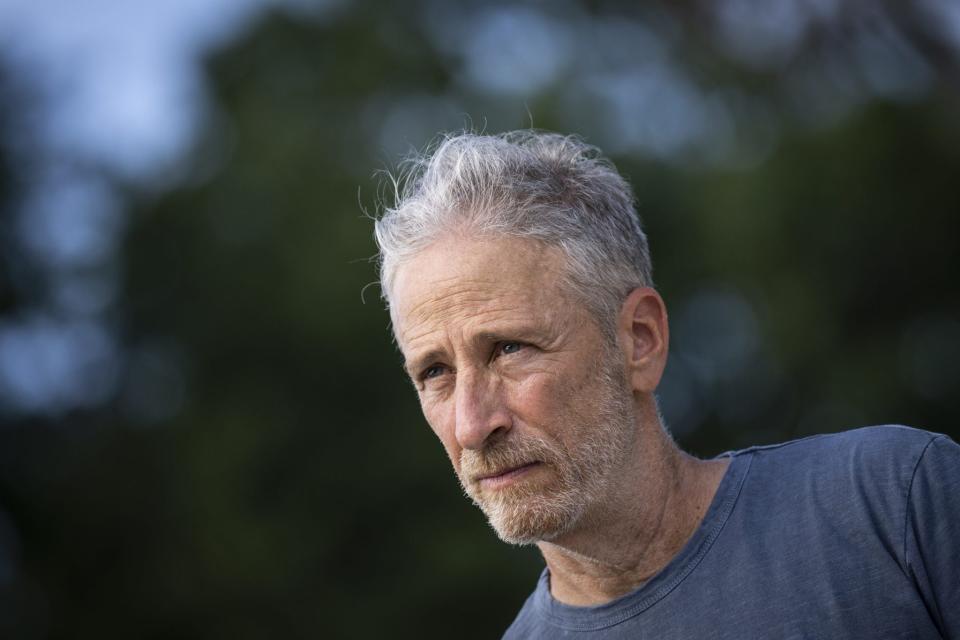Jon Stewart rings the alarm on AI—’We are aiding and abetting in our own destruction’

AI is no joke, but comedian Jon Stewart is seemingly always game to laugh when staring into the void of a potential human-aided robot takeover. That’s his style, after all.
Last week, the former host of The Daily Show for more than a decade and current part-time moderator stopped by The Town With Matthew Belloni, a podcast by The Ringer. Not unlike a late-night revival of Paul Revere, Stewart warned listeners of how quick and potentially damaging an AI invasion might be.
“It's coming for everybody and it’s going to decimate labor in a way we haven't seen,” he told Belloni, likening it to the Industrial Revolution in terms of changing the course of history. And unlike with other historic periods of economic change, he envisions the AI upheaval occuring in the blink of an eye.
“AI is going to f**k this thing in a week when if finally comes online,” Stewart said. He described it as a fast-tracked version of the level of destruction the automotive and industrial revolution had on blue-collar labor.
Discussing how AI is trained on human work to be a more efficient version of what people do, Stewart noted: “We are aiding and abetting in our own destruction; it makes no sense.”
He added that the public is likely only seeing a basic version of what Silicon Valley has to offer, and that the fully realized confidential editions of their products are probably “frighteningly capable of replacing 70% of the labor force.”
Calls for AI regulation have grown louder recently, playing out mainly on Hollywood's stage for now, but a storm is coming. Creatives in the music industry, as well as both Writers Guild of America (WGA) and Screen Actors Guild (SAG-AFTRA) have pushed back against the unmitigated usage of AI as potentially damaging to art in general and to their jobs. Executives could outsource their work amid fights for fair wages. It’s likely just the first wave of many, according to Stewart. And it’s not just geared toward the little fish, he warned. The sharks getting chummy with Silicon Valley are likely to be threatened eventually too.
“If you don’t think it’s going to be coming for development executives and everybody else, you’d be wrong, brother,” cautioned Stewart.
Last February, Tyler Perry said he was pausing multimillion-dollar plans to expand his studio after seeing OpenAI’s video-generation tech Sora. Airing his concerns regarding lost jobs, Perry said that at the pace technology is moving, it feels “everybody in the industry is running a hundred miles an hour to try and catch up, to try and put in guardrails." Pushing for government involvement, Perry projected that AI will change other industries as well.
“AI is not going to replace you, the person who can use AI is going to” and phrases of that ilk have become increasingly prevalent among CEOs and wealthy entrepreneurs alike. But that’s not really the full truth, claimed Stewart. “What they say to their shareholders is, ‘This will be a way to increase productivity without the tack of labor,’” he said. The real question about AI “is how…we utilize it as a tool without it becoming the factory,” he continued.
This is not the first time Stewart has raised red flags about our steamrolling path toward a world with AI. “We have been through technological advances before, and they all have promised a utopian life without drudgery,” Stewart said on The Daily Show this April. “But the reality is, they come for our jobs.”
He cautioned that Silicon Valley will have to learn to pump the breaks if this man-made AI upheaval is to be avoided. In that sense, an AI Big Bang is “not inevitable. But unfortunately it’s going to take quite a bit to get it back in the bag,” he said.
Of course, the government has a hand in this, too, albeit a slow-moving one. As Stewart said: “This is the most digital problem being handled by the most preemptive analog system.” He called out the baby boomers in politics fashioning themselves lame ducks by asking OpenAI CEO Sam Altman for help.
He recalled how figures in government welcomed social media with similarly open arms and now haul out executives to try to hold them accountable for the damage they’ve wrought. “Now, how many times do those guys get called in front of Congress going ‘You’re making all of our daughters sad,’” he posited. “Everybody’s Urkel when it comes to all this s**t,” he said, referencing the all-too-late slogan: "Did I do that?"
This story was originally featured on Fortune.com

 Yahoo Finance
Yahoo Finance 